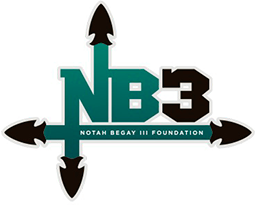The Notah Begay III Foundation (NB3F) is pleased to announce its 2015 “Seeds of Native Health”Capacity Building Grantees. Thanks to the generous support of the Shakopee Mdewakanton Sioux Community (SMSC) and its “Seeds of Native Health” nutrition philanthropy campaign, the NB3 Foundation is awarding six grants to Native American tribes and native-led organizations working to improve nutrition and access to healthy foods for their children and communities.
“Native American tribes are in the best position to improve the health of their own people,” said SMSC Secretary/Treasurer Lori Watso, a champion for the campaign who has spent much of her career in community public health. “Funding and technical assistance through these grants will help tribes develop their own nutritional health strategies.”
“Improving access to healthy foods and increasing nutrition education for our children will require varying approaches and strategies. Informing the strategies is understanding the assets and challenges in our Native communities,” said Olivia Roanhorse, Director of NB3’s Native Strong Program. “This funding supports community health assessments and planning to do this.”
The Capacity Building Grantees are:
- Red Lake Band of Chippewa Indians – Red Lake Local Food Initiative, Minnesota, $20,000: The goal of this project is to conduct a community food/health assessment to measure food production, consumption, and lifestyle activity trends. This will result in an action plan to develop a local, healthy, community-based food system.
- Rosebud Economic Development Corporation – REDCO Community Food Sovereignty Initiative: Assessing and Addressing Food Insecurity on the Rosebud Reservation, South Dakota, $20,000: The goal of this project is to conduct a reservation-wide food sovereignty assessment and utilize other outreach and feedback mechanisms (talking circles, surveys, etc.) to gather input from tribal citizens regarding the relationship of food to health.
- Tucson Indian Center – Finding strengths in the local food environment to promote healthier food consumption among American Indian community members in Tucson, Arizona, $18,000: The project is a collaborative project between the Tucson Indian Center and the University of Arizona Center for American Indian Resilience. The goal of the project is to conduct a community health assessment and implement community planning activities to create an action plan that will be used by the center for long-term planning to address childhood obesity and type 2 diabetes in the Tucson American Indian community.
- American Indian Health Research and Education Alliance – Community Health Assessment on Youth Diabetes Risk, Kansas, $20,000: The project will take place in both the Kickapoo Tribe and Prairie Band Potawatomi Nation communities to develop a sustainable action plan, specific to each community, that will help address the issues related to childhood obesity and diabetes by using information from health assessments and surveys.
- Blackfeet Community College – From Need to Seed: A Community Action Plan to Reduce Childhood Obesity and Diabetes, Montana, $20,000: The project will focus on healthy nutrition and assessments of youth children (ages 2-7) and their parents, who will be encouraged to participate in talking circles. This will result in a community action plan to address childhood obesity and type 2 diabetes among Blackfeet Tribal Nation members.
- Urban Native Education Alliance –Building Capacity for Urban Native Youth Health Project, Washington, $20,000: The goal of this project is to bring together Native youth and community to discuss nutrition and healthy food knowledge and access by conducting a community (health) needs assessment.
All of these projects reflect the importance of community-driven efforts in reducing childhood obesity and type 2 diabetes among Native American children and their families.
About Seeds of Native Health
Seeds of Native Health is a comprehensive, national campaign to improve Native American nutrition through capacity building, education, and research, supported by the Shakopee Mdewakanton Sioux Community. The campaign builds on localized efforts to solve the problems of Indian nutrition and hopes to raise awareness, spread knowledge, create capacity for change, and develop additional solutions on a broader scale. (www.seedsofnativehealth.org/testingvc)
About the Notah Begay III Foundation
The NB3 Foundation is the only national Native American nonprofit organization solely dedicated to reversing Native American childhood obesity and type-2 diabetes. NB3 Foundation is setting a national standard for investing in evidence-based, community-driven and culturally relevant programs that prevent childhood obesity and type 2 diabetes, ensuring healthy futures for Native American children and their communities.
Since its launch in 2005, NB3 Foundation has grown its reputation and track record in Indian Country in the areas of grant making, research, evaluation, direct programming and policy advocacy. NB3 Foundation invests in and works closely with grassroots, Native-led organizations across the country that are exploring promising new practices, expanding proven methods, conducting community-based research, and evaluating impact. (www.nb3foundation.org)
About the Shakopee Mdewakanton Sioux Community
The Shakopee Mdewakaton Sioux Community (SMSC), a federally recognized sovereign Indian tribe located southwest of Minneapolis, Minnesota, is leading the Seeds of Native Health. The SMSC has a deep-seated tradition of helping other tribes and Native American people. The campaign represents a new extension of its long history of philanthropy by committing a portion of its annual charitable giving to a dedicated purpose. Since opening its Gaming Enterprise in the 1990s, the SMSC has donated more than $325 million to organizations and causes and has contributed millions more to regional governments and infrastructure projects such as roads, water and sewer systems, and emergency services. (www.shakopeedakota.org)

